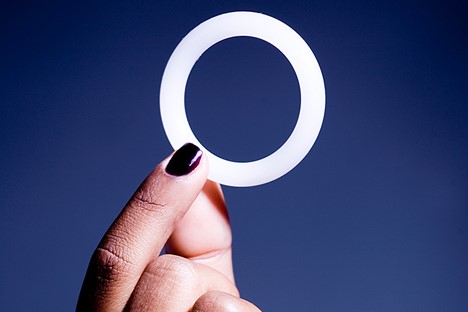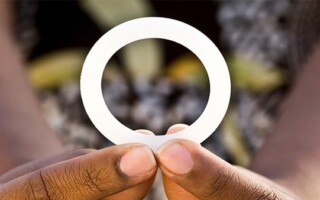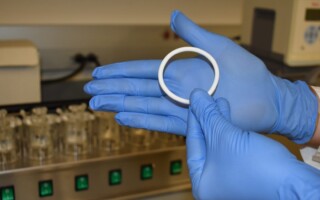
Women and girls continue to bear the global burden of HIV/AIDS; nearly 60% of all new adult infections are among women. Young women aged 15–24 are more than twice as likely to acquire HIV than young men.
___________
The International Partnership for Microbicides (IPM) developed the Dapivirine Vaginal Ring (DapiRing™ or DVR), a long-acting, user-controlled vaginal ring to reduce the risk of HIV transmission during vaginal sex. The Population Council acquired the DapiRing and other assets from IPM in 2022, including a key subset of the DapiRing development team.
What is the DapiRing?
The DapiRing is a vaginal ring made of flexible silicone that a user can insert into the vagina themselves for 1 month to reduce the risk of HIV transmission during vaginal sex. After a month, they should replace it with a new ring. The ring sits inside the vagina near the cervix where it slowly releases an antiretroviral drug called dapivirine at the site of potential infection. Dapivirine works by blocking HIV’s ability to make copies of itself inside healthy cells.
The DapiRing must be in place for 24 hours before it reduces the risk of HIV infection. It is important that the ring is left in place for the full month. There is no need to remove the ring during menstruation, and the ring can be used with a tampon. The ring should not be removed during sex, and it is rarely felt by either partner during sex and, if felt, is usually not bothersome. A woman can go about her daily activities as usual. The ring can be used with most forms of contraception, but should not be used with contraceptive vaginal rings, diaphragms, menstrual cups or cervical caps.
What does the research say about the DapiRing?
The DapiRing was shown to reduce HIV risk by approximately 30% in two randomized controlled trials (Baeten et al. 2016; Nel et al. 2016). Later, in open-label studies, ring use among women seemed to be more consistent, with a potentially greater reduction in HIV risk observed based on statistical modeling (Baeten et al. 2021). In the DREAM study, the HIV incidence rate was 62% lower than an imputed placebo incidence rate (Nel et al. 2021). The ring does not eliminate the risk of HIV infection, and it does not prevent other STIs or unintended pregnancy, so it should be used with either a male or female condom.
The DapiRing expands HIV prevention choice and has a favorable safety profile. As a user-controlled method, the monthly ring could be an important option for women who are either unable to use higher efficacy methods, or who choose not to do so.
Regulatory Guidance on the DapiRing
The DapiRing received a positive scientific opinion in July 2020 from the European Medicines Agency (EMA) for use among women ages 18 and older. In July 2024, the EMA extended the label to include breastfeeding women. In June 2025, the EMA extended the indication to adolescent girls ages 16 and up.
The ring has received regulatory approval in 12 African countries with additional applications pending and planned. The ring has also received Prequalification and a recommendation from the World Health Organization (WHO).
DapiRing Distribution
The DapiRing is currently being sold by IMRES B.V., who the Council has partnered with for global distribution.
For more information on the PrEP ring, please view our resources or visit https://prepringinfo.org.
DISCLAIMER:
This is a global website intended for visitors seeking information on the Population Council’s worldwide activities. The information on this website may not comply with the local regulatory requirements of individual countries.




